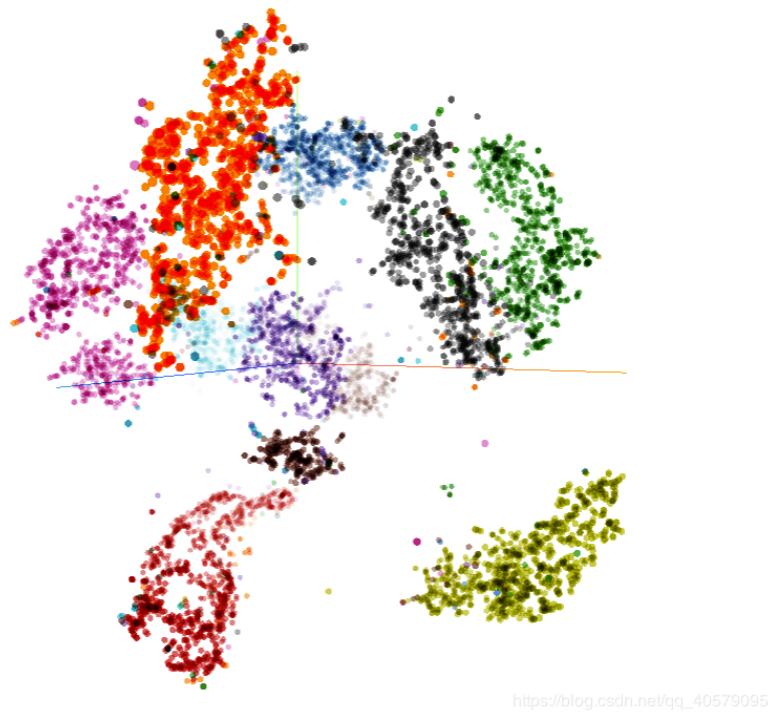本文实例为大家分享了基于Tensorflow的MNIST手写数字识别分类的具体实现代码,供大家参考,具体内容如下
代码如下:
import tensorflow as tf
import numpy as np
from tensorflow.examples.tutorials.mnist import input_data
from tensorflow.contrib.tensorboard.plugins import projector
import time
IMAGE_PIXELS = 28
hidden_unit = 100
output_nums = 10
learning_rate = 0.001
train_steps = 50000
batch_size = 500
test_data_size = 10000
#日志目录(这里根据自己的目录修改)
logdir = 'D:/Develop_Software/Anaconda3/WorkDirectory/summary/mnist'
#导入mnist数据
mnist = input_data.read_data_sets('MNIST_data', one_hot = True)
#全局训练步数
global_step = tf.Variable(0, name = 'global_step', trainable = False)
with tf.name_scope('input'):
#输入数据
with tf.name_scope('x'):
x = tf.placeholder(
dtype = tf.float32, shape = (None, IMAGE_PIXELS * IMAGE_PIXELS))
#收集x图像的会总数据
with tf.name_scope('x_summary'):
shaped_image_batch = tf.reshape(
tensor = x,
shape = (-1, IMAGE_PIXELS, IMAGE_PIXELS, 1),
name = 'shaped_image_batch')
tf.summary.image(name = 'image_summary',
tensor = shaped_image_batch,
max_outputs = 10)
with tf.name_scope('y_'):
y_ = tf.placeholder(dtype = tf.float32, shape = (None, 10))
with tf.name_scope('hidden_layer'):
with tf.name_scope('hidden_arg'):
#隐层模型参数
with tf.name_scope('hid_w'):
hid_w = tf.Variable(
tf.truncated_normal(shape = (IMAGE_PIXELS * IMAGE_PIXELS, hidden_unit)),
name = 'hidden_w')
#添加获取隐层权重统计值汇总数据的汇总操作
tf.summary.histogram(name = 'weights', values = hid_w)
with tf.name_scope('hid_b'):
hid_b = tf.Variable(tf.zeros(shape = (1, hidden_unit), dtype = tf.float32),
name = 'hidden_b')
#隐层输出
with tf.name_scope('relu'):
hid_out = tf.nn.relu(tf.matmul(x, hid_w) + hid_b)
with tf.name_scope('softmax_layer'):
with tf.name_scope('softmax_arg'):
#softmax层参数
with tf.name_scope('sm_w'):
sm_w = tf.Variable(
tf.truncated_normal(shape = (hidden_unit, output_nums)),
name = 'softmax_w')
#添加获取softmax层权重统计值汇总数据的汇总操作
tf.summary.histogram(name = 'weights', values = sm_w)
with tf.name_scope('sm_b'):
sm_b = tf.Variable(tf.zeros(shape = (1, output_nums), dtype = tf.float32),
name = 'softmax_b')
#softmax层的输出
with tf.name_scope('softmax'):
y = tf.nn.softmax(tf.matmul(hid_out, sm_w) + sm_b)
#梯度裁剪,因为概率取值为[0, 1]为避免出现无意义的log(0),故将y值裁剪到[1e-10, 1]
y_clip = tf.clip_by_value(y, 1.0e-10, 1 - 1.0e-5)
with tf.name_scope('cross_entropy'):
#使用交叉熵代价函数
cross_entropy = -tf.reduce_sum(y_ * tf.log(y_clip) + (1 - y_) * tf.log(1 - y_clip))
#添加获取交叉熵的汇总操作
tf.summary.scalar(name = 'cross_entropy', tensor = cross_entropy)
with tf.name_scope('train'):
#若不使用同步训练机制,使用Adam优化器
optimizer = tf.train.AdamOptimizer(learning_rate = learning_rate)
#单步训练操作,
train_op = optimizer.minimize(cross_entropy, global_step = global_step)
#加载测试数据
test_image = mnist.test.images
test_label = mnist.test.labels
test_feed = {x:test_image, y_:test_label}
with tf.name_scope('accuracy'):
prediction = tf.equal(tf.argmax(input = y, axis = 1),
tf.argmax(input = y_, axis = 1))
accuracy = tf.reduce_mean(
input_tensor = tf.cast(x = prediction, dtype = tf.float32))
#创建嵌入变量
embedding_var = tf.Variable(test_image, trainable = False, name = 'embedding')
saver = tf.train.Saver({'embedding':embedding_var})
#创建元数据文件,将MNIST图像测试集对应的标签写入文件
def CreateMedaDataFile():
with open(logdir + '/metadata.tsv', 'w') as f:
label = np.nonzero(test_label)[1]
for i in range(test_data_size):
f.write('%d\n' % label[i])
#创建投影配置参数
def CreateProjectorConfig():
config = projector.ProjectorConfig()
embeddings = config.embeddings.add()
embeddings.tensor_name = 'embedding:0'
embeddings.metadata_path = logdir + '/metadata.tsv'
projector.visualize_embeddings(writer, config)
#聚集汇总操作
merged = tf.summary.merge_all()
#创建会话的配置参数
sess_config = tf.ConfigProto(
allow_soft_placement = True,
log_device_placement = False)
#创建会话
with tf.Session(config = sess_config) as sess:
#创建FileWriter实例
writer = tf.summary.FileWriter(logdir = logdir, graph = sess.graph)
#初始化全局变量
sess.run(tf.global_variables_initializer())
time_begin = time.time()
print('Training begin time: %f' % time_begin)
while True:
#加载训练批数据
batch_x, batch_y = mnist.train.next_batch(batch_size)
train_feed = {x:batch_x, y_:batch_y}
loss, _, summary= sess.run([cross_entropy, train_op, merged], feed_dict = train_feed)
step = global_step.eval()
#如果step为100的整数倍
if step % 100 == 0:
now = time.time()
print('%f: global_step = %d, loss = %f' % (
now, step, loss))
#向事件文件中添加汇总数据
writer.add_summary(summary = summary, global_step = step)
#若大于等于训练总步数,退出训练
if step >= train_steps:
break
time_end = time.time()
print('Training end time: %f' % time_end)
print('Training time: %f' % (time_end - time_begin))
#测试模型精度
test_accuracy = sess.run(accuracy, feed_dict = test_feed)
print('accuracy: %f' % test_accuracy)
saver.save(sess = sess, save_path = logdir + '/embedding_var.ckpt')
CreateMedaDataFile()
CreateProjectorConfig()
#关闭FileWriter
writer.close()

以上就是本文的全部内容,希望对大家的学习有所帮助,也希望大家多多支持自学编程网。

- 本文固定链接: https://zxbcw.cn/post/188842/
- 转载请注明:必须在正文中标注并保留原文链接
- QQ群: PHP高手阵营官方总群(344148542)
- QQ群: Yii2.0开发(304864863)
